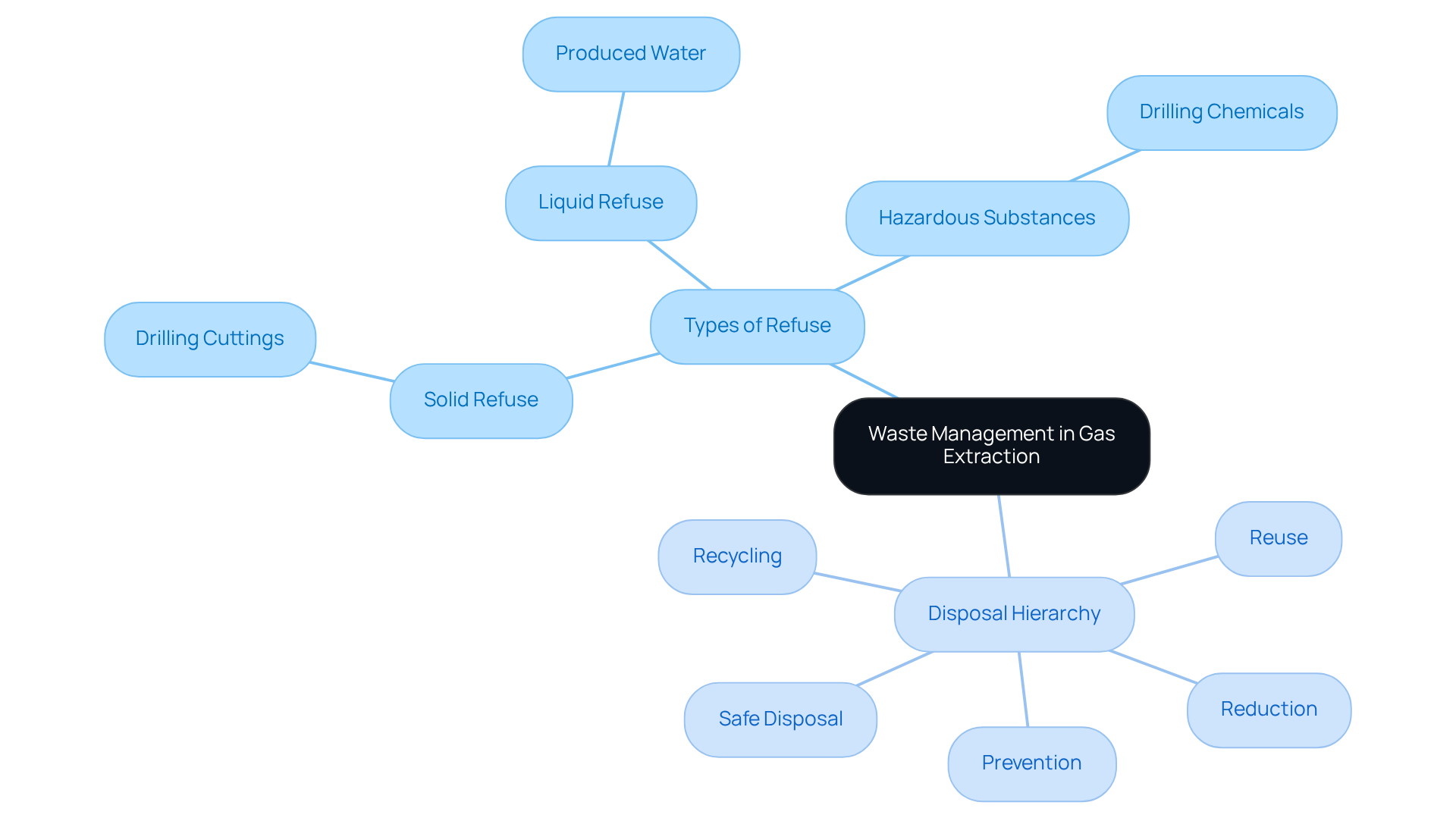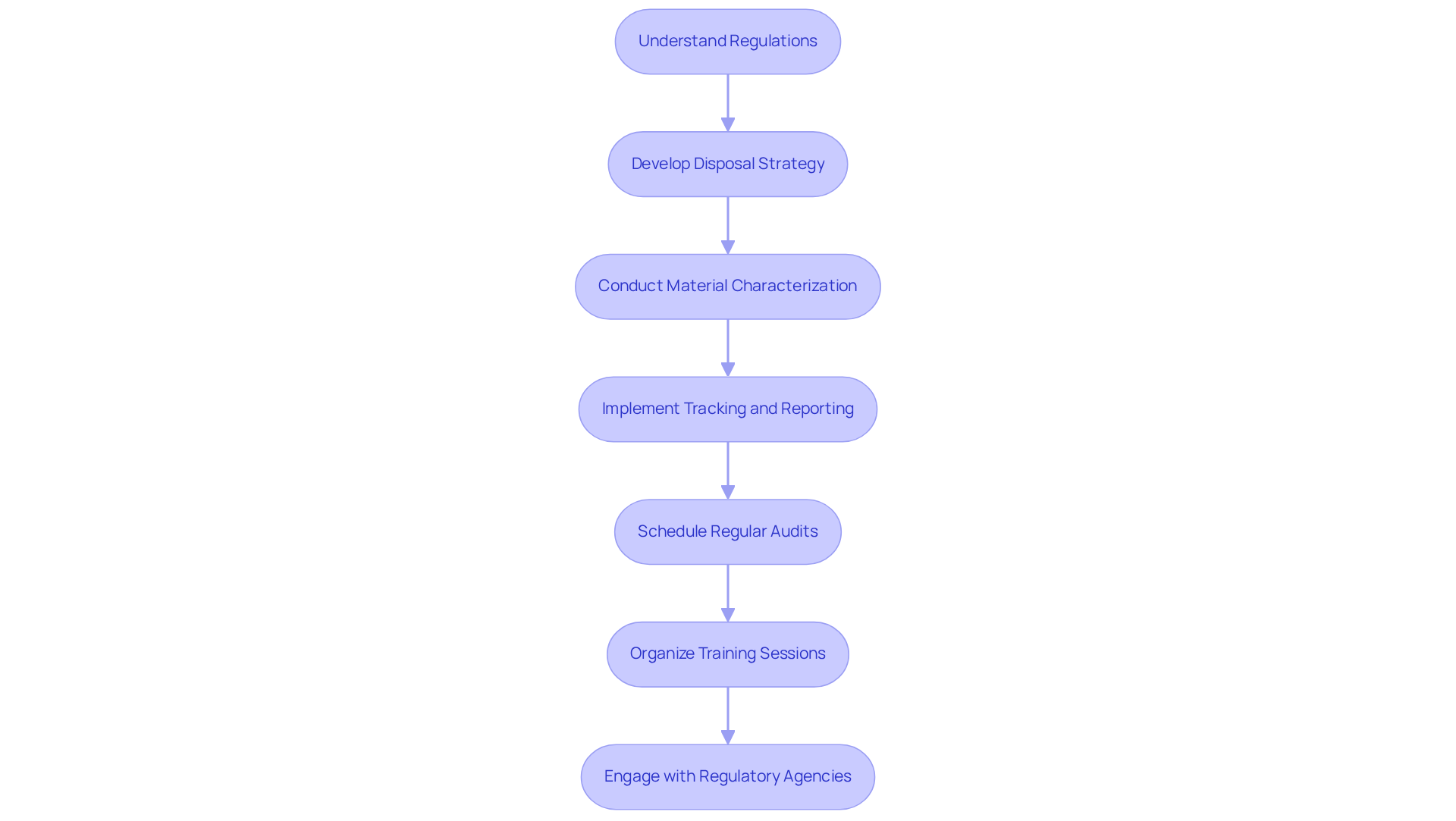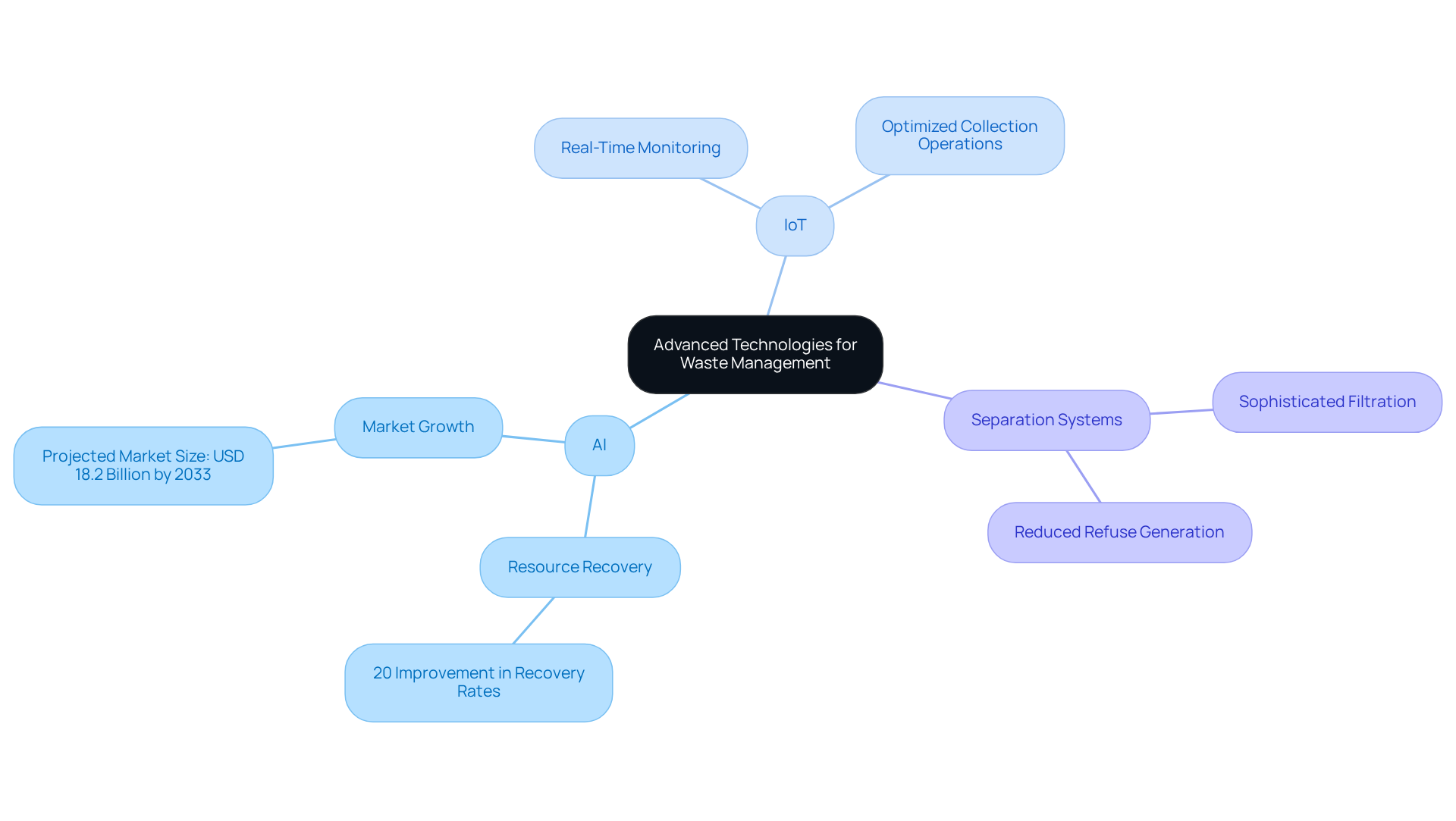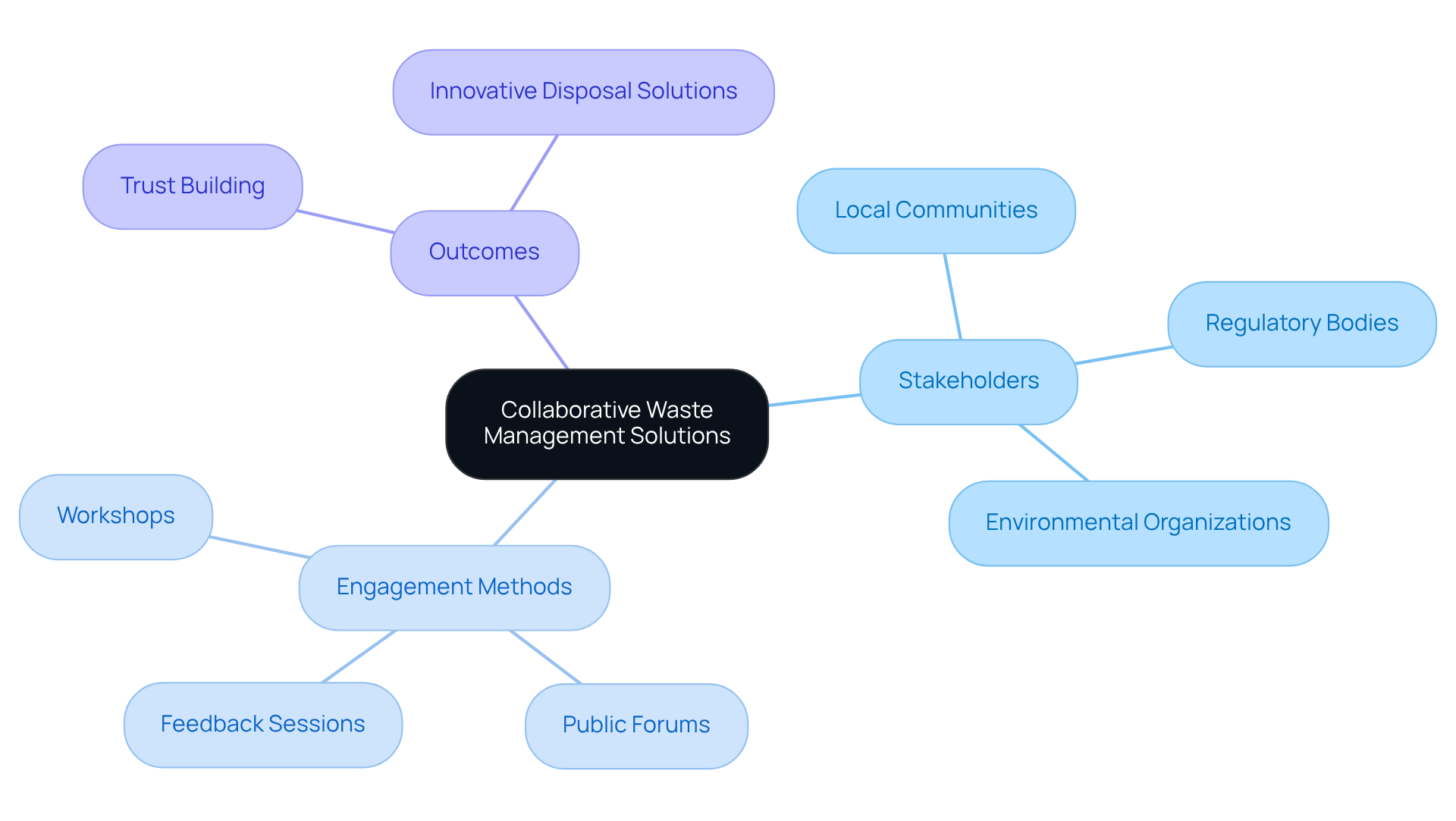Overview
Effective waste management in gas extraction is crucial and can be achieved through strategies such as:
- Optimizing disposal hierarchies
- Integrating advanced technologies
- Engaging stakeholders in collaborative solutions
Understanding the types of waste generated is essential, as is adhering to regulatory compliance. Furthermore, innovations like AI and IoT play a significant role in enhancing operational efficiency and sustainability in waste handling practices.
Introduction
Effective waste management stands as a critical imperative in the gas extraction industry, where the byproducts of drilling and processing pose substantial environmental challenges. This article explores four pivotal strategies designed to not only enhance operational efficiency but also foster sustainability within the sector. Yet, the central question persists: how can companies effectively reconcile regulatory compliance, technological advancements, and stakeholder engagement to establish a robust waste management framework? By examining these strategies, we glean valuable insights into navigating the intricate landscape of waste management in gas extraction, all while fulfilling our environmental responsibilities.
Understand Waste Management Principles in Gas Extraction
The efficient disposal of materials is a critical aspect of waste management in gas extraction. Understanding the various types of refuse produced—such as:
- Solid refuse like drilling cuttings
- Liquid refuse including produced water
- Hazardous substances from drilling chemicals
is essential for effective waste management in gas extraction. Recognizing the disposal hierarchy is paramount in the context of waste management in gas extraction; this framework emphasizes:
- Prevention
- Reduction
- Reuse
- Recycling
- Safe disposal
By optimizing drilling processes to minimize byproduct generation and selecting less hazardous materials, operators can significantly enhance waste management in gas extraction while reducing their overall footprint.
Moreover, educating staff on disposal principles is vital. This education equips all team members with the knowledge and skills necessary to manage refuse responsibly and effectively. Such an approach not only enhances operational efficiency but also aligns with sustainable practices that are increasingly important in the energy sector. As the industry evolves, implementing these strategies is not just beneficial; it is imperative for future success.

Navigate Regulatory Compliance for Waste Management
Adherence to waste management in gas extraction regulations is crucial for gas production activities. Operators must be well-versed in relevant laws, including the Resource Conservation and Recovery Act (RCRA) and state-specific regulations. Developing a comprehensive disposal strategy that includes material characterization, tracking, and reporting is essential for compliance with waste management in gas extraction. Regular audits and training sessions will ensure that all personnel understand compliance requirements and best practices. Furthermore, proactively engaging with regulatory agencies can facilitate smoother operations and foster positive relationships with stakeholders.

Implement Advanced Technologies for Efficient Waste Management
The integration of advanced technologies such as AI, machine learning, and IoT is poised to revolutionize waste management in gas extraction. This transformation addresses the critical need for improved resource tracking and reporting processes, ensuring that data is both precise and actionable. Companies utilizing AI have reported a remarkable 20% improvement in resource recovery rates, underscoring the effectiveness of these innovations.
IoT devices are instrumental in this evolution, offering real-time monitoring of refuse levels that enhances collection and disposal operations. Furthermore, the implementation of sophisticated separation and filtration systems can play a significant role in waste management in gas extraction by drastically reducing the refuse generated during drilling activities. By investing in these cutting-edge technologies, companies not only boost operational efficiency but also align with sustainability objectives, significantly minimizing their environmental footprint.
The AI sector for resource handling is projected to reach USD 18.2 billion by 2033, highlighting the increasing significance of these advancements in the industry. Embracing these technologies is not merely a choice; it is a strategic imperative for companies aiming to thrive in a competitive landscape while addressing environmental concerns.

Engage Stakeholders for Collaborative Waste Management Solutions
Involving stakeholders in resource handling initiatives is not just beneficial; it is essential for achieving sustainable outcomes in gas extraction. Identifying key stakeholders—local communities, regulatory bodies, and environmental organizations—is the first step toward fostering open communication channels. This collaborative effort can lead to innovative disposal solutions that effectively address community concerns and meet regulatory standards.
By hosting workshops, public forums, and feedback sessions, organizations can facilitate meaningful dialogue, building trust among stakeholders. This trust is crucial for implementing more effective waste management in gas extraction practices, ultimately benefiting all parties involved.

Conclusion
The significance of effective waste management in gas extraction is paramount. By implementing strategic approaches that encompass an understanding of waste types, adherence to regulatory compliance, the utilization of advanced technologies, and engagement with stakeholders, operators can markedly enhance their waste management practices. These strategies not only address environmental concerns but also bolster operational efficiency and sustainability within the industry.
Key insights have emerged throughout this discussion, underscoring the necessity of a comprehensive understanding of waste types, the critical role of regulatory compliance, the transformative potential of innovative technologies, and the value of stakeholder engagement. Each of these elements is essential in creating a robust framework for waste management that satisfies both operational needs and environmental responsibilities.
The call to action is unequivocal: embracing these best practices is vital for the future of gas extraction. By prioritizing effective waste management strategies, companies can mitigate their environmental impact while positioning themselves as leaders in sustainable practices within the energy sector. The journey toward responsible waste management is a collective effort that necessitates commitment and collaboration from all stakeholders involved.
Frequently Asked Questions
What are the main types of refuse produced in gas extraction?
The main types of refuse produced in gas extraction include solid refuse like drilling cuttings, liquid refuse such as produced water, and hazardous substances from drilling chemicals.
What is the disposal hierarchy in waste management for gas extraction?
The disposal hierarchy in waste management for gas extraction emphasizes the following steps: prevention, reduction, reuse, recycling, and safe disposal.
How can operators enhance waste management in gas extraction?
Operators can enhance waste management by optimizing drilling processes to minimize byproduct generation and selecting less hazardous materials.
Why is educating staff on disposal principles important in gas extraction?
Educating staff on disposal principles is important because it equips team members with the knowledge and skills to manage refuse responsibly and effectively, enhancing operational efficiency and aligning with sustainable practices.
Why is effective waste management in gas extraction imperative for the future?
Effective waste management is imperative for the future as it not only improves operational efficiency but also aligns with sustainable practices that are increasingly important in the evolving energy sector.
List of Sources
- Understand Waste Management Principles in Gas Extraction
- Inspiring Quotations on Waste Management | Duromech - Duromech® (https://duromech.in/inspiring-quotations-on-waste-management-duromech)
- Solid waste generation from oil and gas industries in United Arab Emirates (https://sciencedirect.com/science/article/abs/pii/S0304389405000178)
- Waste Minimization in Gas Treating and Processing Operations (https://rrc.texas.gov/oil-and-gas/publications-and-notices/publications/waste-minimization-program/operation-specific-documents/waste-minimization-in-gas-treating-and-processing-operations)
- A review of waste management approaches to maximise sustainable value of waste from the oil and gas industry and potential for the State of Qatar (https://sciencedirect.com/science/article/pii/S0016236122030447)
- Quotes About Waste Management. QuotesGram (https://in.pinterest.com/pin/quotes-about-waste-management-quotesgram--897905244434889970)
- Navigate Regulatory Compliance for Waste Management
- Understanding Regulatory Compliance for Oil and Gas Asset Inspections - SEE Forge creators of FAT FINGER (https://fatfinger.io/understanding-regulatory-compliance-for-oil-and-gas-inspections)
- Oil and Gas Compliance: What You Need to Know (https://accuristech.com/oil-and-gas-compliance)
- Management of Oil and Gas Exploration and Production Waste | US EPA (https://epa.gov/hw/management-oil-and-gas-exploration-and-production-waste)
- New Owner Clean Air Act Audit Program for Oil and Natural Gas Exploration and Production Facilities | US EPA (https://epa.gov/enforcement/new-owner-clean-air-act-audit-program-oil-and-natural-gas-exploration-and-production)
- Hazardous Waste Statistics to Know in 2025 | HWH Environmental (https://hwhenvironmental.com/facts-and-statistics-about-waste)
- Implement Advanced Technologies for Efficient Waste Management
- Revolutionizing waste management: the role of AI in building sustainable practices (https://aiforgood.itu.int/revolutionizing-waste-management-the-role-of-ai-in-building-sustainable-practices)
- (PDF) Artificial Intelligence in Waste Management in the Context of Implementing Circular Economy (https://researchgate.net/publication/387601557_Artificial_Intelligence_in_Waste_Management_in_the_Context_of_Implementing_Circular_Economy)
- What Statistics Indicate Ai Impact on Waste Reduction? → Question (https://sustainability-directory.com/question/what-statistics-indicate-ai-impact-on-waste-reduction)
- What Statistics Indicate Ai Use in Recycling? → Question (https://sustainability-directory.com/question/what-statistics-indicate-ai-use-in-recycling)
- Ai In The Waste Industry Statistics Statistics: ZipDo Education Reports 2025 (https://zipdo.co/ai-in-the-waste-industry-statistics)
- Engage Stakeholders for Collaborative Waste Management Solutions
- 15 Plastic Pollution Quotes to Inspire You to Go Waste Free | Earth.Org (https://earth.org/plastic-pollution-quotes)
- 30 of the Most Impactful Climate Change Quotes - Curious Earth (https://curious.earth/blog/climate-change-quotes)
- Proven Strategies for Success in Gas Extraction Logistics Management (https://blog.harbingerland.com/proven-strategies-for-success-in-gas-extraction-logistics-management)
- 20 Environmental Sustainability Quotes: Expert Guide with Insights and Inspiration | What is Green Living? (https://whatisgreenliving.com/environmental-sustainability-quotes)
- 12 Recycling and Sustainability Quotes to Inspire Kindness to our Earth (https://harmony1.com/recycling-sustainability-quotes)




